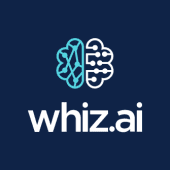Best Healthcare Analytics Software
Best healthcare analytics software are Sisense, Alteryx, CareCloud, Datapine, OspLabs, ScienceSoft, and Dental intelligence. Use one of Best healthcare analytical software to understand what kind of services you are providing and their performance in customer responses.



No Cost Personal Advisor
List of 20 Best Healthcare Analytics Software
Emergents | 2024
Software by Virgin Pulse
Virgin Pulse is one of the best healthcare analytics software using AI technology. This cloud-based employee health and wellbeing solution is designed to support workforce cultures and employee health. The easy-to-implement platform promotes a healthy lifestyle and improves the workforce practices among the workers to deliver a meaningful, healthy life. Learn more about Virgin Pulse
Explore various Virgin Pulse features, compare the pricing plans, and unlock the potential of seamless operations by selecting the right software for your business.
Features
View all Virgin Pulse Features- Employee Portal
- Incentive Management
- Goal Setting / Tracking
- Activity Tracking
- Health Risk Assessment
- Program Management
- Gamification
Virgin Pulse Caters to
- StartUps
- SMBs
- Agencies
- Enterprises
Emergents | 2024
Software by UpToDate
UpToDate is a popular healthcare software among medical professionals offering proven healthcare analytics solutions to them. This software allows medical practitioners to provide evidence-based clinical support to their patients. UpToDate enables its users to stay up-to-date with their patients' clinical data, treatment plans, and more. Learn more about UpToDate
Explore various UpToDate features, compare the pricing plans, and unlock the potential of seamless operations by selecting the right software for your business.
Features
View all UpToDate Features- EMR / EHR
- Data Import / Export
- Multi-Physician
- Campaign Management
- Physician Scheduling
- Appointment Management
- Patient Account Management
- Practice Management
UpToDate Caters to
- StartUps
- SMBs
- Agencies
- Enterprises
Emergents | 2024
Professional BI Dashboard Software
The healthcare analytics platform offered by Datapine software helps the medical professionals take clinical decisions based on actionable insights from large-scale data. This software's dynamic and interactive dashboard enables its users to conduct analytics and make an accurate data-driven decision. This analytics tool helps medical professionals to achieve excellence in their field. Learn more about datapine
Explore various datapine features, compare the pricing plans, and unlock the potential of seamless operations by selecting the right software for your business.
Features
View all datapine Features- Collaboration
- Performance Management
- Data filtering
- Visual Discovery
- Dashboard Creation
- Regression Analysis
- Ad hoc Query
- Budgeting & Forecasting
datapine Caters to
- StartUps
- SMBs
- Agencies
- Enterprises
Contenders | 2024
Empowering people to turn data into breakthroughs
The healthcare data analytics platform of Alteryx comes with a code-free automated system that allows healthcare companies to increase their decision-making speed. This healthcare software enables its users to improve their patient experience by providing deep insights with the help of AI technology. Moreover, with the automated system, companies can quickly streamline critical processes. Read Alteryx Reviews
Explore various Alteryx features, compare the pricing plans, and unlock the potential of seamless operations by selecting the right software for your business.
Features
View all Alteryx Features- Simulation Models
- Ad hoc Analysis
- For Healthcare
- Dashboard
- Model Training
- Data Quality Control
- Text Mining
- Linked Data Management
Alteryx Caters to
- StartUps
- SMBs
- Agencies
- Enterprises
Emergents | 2024
Software by IBM
IBM Watson offers a flexible analytics platform along with various healthcare analytics tools using which physicians can easily manage their patient's treatment plans. With a robust analytic database management system, the easy-to-use Watson Health software provides data insights to medical professionals and improves efficiency. Learn more about IBM Watson
Explore various IBM Watson features, compare the pricing plans, and unlock the potential of seamless operations by selecting the right software for your business.
Features
View all IBM Watson Features- Collaboration
- Segmentation
- Sales Intelligence
- Email Marketing
- Dashboard
- Predictive Analytics
- Virtual Personal Assistant (VPA)
- Knowledge Management
Pricing
Free
$ 0
Per Month
Plus
$ 30
Per Month
Professional
$ 80
Per Month
IBM Watson Caters to
- StartUps
- SMBs
- Agencies
- Enterprises
Contenders | 2024
Software by Tableau
Tableau is one of powerful medical analytics software enabling healthcare providers to leverage more data analytics. Using this medical data analytics software, medical professionals can recommend more accurate treatments to their patients. Tableau utilizes the power of cloud technology and delivers operational efficiency to leading healthcare organizations. Read Tableau Reviews
Explore various Tableau features, compare the pricing plans, and unlock the potential of seamless operations by selecting the right software for your business.
Features
View all Tableau Features- Online Analytical Processing (OLAP)
- Relational Display
- Visual Discovery
- Dashboard Creation
- Simulation Models
- Filtered Views
Tableau Caters to
- StartUps
- SMBs
- Agencies
- Enterprises
Emergents | 2024
The easiest way to get real business insights
Sisense is a renowned clinical analytics software enabling the healthcare industry to improve patient care through Artificial Intelligence technology. This analytics software can perform low-code, no-code, and code-first healthcare analytics. The medical sector can improve critical healthcare decisions with deep insights and visibility. Read Sisense Reviews
Explore various Sisense features, compare the pricing plans, and unlock the potential of seamless operations by selecting the right software for your business.
Features
View all Sisense Features- Trend / Problem Indicators
- Data Visualization
- Performance Metrics
- transform and load (ETL)
- Extract
- Ad hoc Query
- Dashboard
- Ad hoc Analysis
Sisense Caters to
- StartUps
- SMBs
- Agencies
- Enterprises
Contenders | 2024
Software by Minitab
Minitab's Healthcare data analytics tools help medical professionals to solve healthcare problems in a structured way. Using Minitab's healthcare module, medical experts can tackle all the challenges involved in patient care. In addition, the powerful data analysis of this software allows healthcare service providers to monitor ongoing trends and deliver patient care accordingly. Read Minitab Reviews
Explore various Minitab features, compare the pricing plans, and unlock the potential of seamless operations by selecting the right software for your business.
Features
View all Minitab Features- Supplier Quality Control
- Data Entry
- Time Series
- Data Linking
- Performance Metrics
- Forecasting
- Statistical Process Control
- Excel Loader
Minitab Caters to
- StartUps
- SMBs
- Agencies
- Enterprises
Emergents | 2024
Software by Cerner Corporation PTY Limited
Cerner is one of the best healthcare analytics software enabling medical professionals to discover actionable insights through its pre-built analytic system and provide better patient care. Built with an interactive dashboard, the Cerner software offers real-time access to patient data. This allows medical experts to provide better treatment by analyzing unstructured clinical data. Learn more about Cerner
Explore various Cerner features, compare the pricing plans, and unlock the potential of seamless operations by selecting the right software for your business.
Features
View all Cerner Features- E-Prescribing
- Patient Appointments
- Voice Recognition
- Reporting
- Appointment Management
- Document Management
- Billing & Payment Management
- Scheduling
Pricing
Basic
$ 25
User/Month
Cerner Caters to
- StartUps
- SMBs
- Agencies
- Enterprises
Emergents | 2024
Software by Allscripts
Allscripts is one of the well-known names in providing exceptional healthcare analytics platforms and EMR solutions. Allscripts healthcare services help medical professionals to manage their clinical and operational needs effectively and efficiently. The healthcare industry can easily improve their clinical performance utilizing the data analysis system of Allscripts. Learn more about Allscripts
Explore various Allscripts features, compare the pricing plans, and unlock the potential of seamless operations by selecting the right software for your business.
Allscripts Caters to
- StartUps
- SMBs
- Agencies
- Enterprises
Emergents | 2024
Software by Dental Intelligence
Dental Intelligence is one of the top healthcare analytics companies providing various healthcare services, including a patient communication tool that helps improve patient engagement between patients and medical experts. The software delivers an end-to-end practice performance solution with many actionable insights along with automation systems to the dental market. Learn more about Dental Intelligence
Explore various Dental Intelligence features, compare the pricing plans, and unlock the potential of seamless operations by selecting the right software for your business.
- Appointment Management
- Appointment Reminders
Dental Intelligence Caters to
- StartUps
- SMBs
- Agencies
- Enterprises
Emergents | 2024
Software by Healthgrades
The Healthgrades CRM software provides the world's first CRM solution to the healthcare industry. Healthcare organizations can easily improve their patient experience using healthcare analytics software. Apart from building strong relationships with patients, these simple and intuitive software healthcare companies can run more effective marketing programs and manage them effectively. Learn more about Healthgrades CRM
Explore various Healthgrades CRM features, compare the pricing plans, and unlock the potential of seamless operations by selecting the right software for your business.
Features
View all Healthgrades CRM Features- Audience Targeting
- Patient Communications
- Predictive Analytics
- Physician Management
- Marketing Automation
- Patient Management
- Campaign Management
- Medical History Records
Healthgrades CRM Caters to
- StartUps
- SMBs
- Agencies
- Enterprises
Emergents | 2024
Software by CareCloud
CareCloud is a forefront business intelligence solution provider. The healthcare analytics solutions of CareCloud offer deep insights by effortlessly performing data analysis operations. The platform is capable of delivering revenue-generating reports. In the centralized analytic system of CareCloud, all patient information is stored and analyzed. This helps healthcare facilities to provide better patient care. Read CareCloud Reviews
Explore various CareCloud features, compare the pricing plans, and unlock the potential of seamless operations by selecting the right software for your business.
Features
View all CareCloud Features- E-Prescribing
- Reporting
- Patient Portal
- Dashboard
- Electronic Prescribing
- EMR / EHR
- Insurance Eligibility Verification
- Billing & Invoicing
Pricing
Starter
$ 349
Per Month
CareCloud Caters to
- StartUps
- SMBs
- Agencies
- Enterprises
Emergents | 2024
Software by Glitz IT Solutions
Solace is one of the top Hospital management ERP solution providers. Solace's healthcare analytics platform allows healthcare organizations to manage and monitor events effectively. With Solace's powerful data analytics and intelligence report, management can easily handle single or multi-specialty hospital activity without hassle. Learn more about Solace
Explore various Solace features, compare the pricing plans, and unlock the potential of seamless operations by selecting the right software for your business.
Features
View all Solace Features- Claims Management
- Case Management
- Patient Records Management
- Charting
- Appointment Scheduling
- Case List Management
- Inventory Management
- Dashboard
Solace Caters to
- StartUps
- SMBs
- Agencies
- Enterprises
Emergents | 2024
Software by Greenway Health
Greenway's healthcare data analytics platform is integrated with electronic health records and practice management systems. Greenway's featured-rich healthcare software helps healthcare organizations manage and streamline their operations effectively. Integrated practice management allows users to automate complex tasks and achieve success through value-based care. Learn more about Greenway Health
Explore various Greenway Health features, compare the pricing plans, and unlock the potential of seamless operations by selecting the right software for your business.
Features
View all Greenway Health Features- Billing & Invoicing
- Patient Records
- Patient Monitoring
- Multi-Office
- Action Plan Management
- Patient Billing
- Patient Record Management
Greenway Health Caters to
- StartUps
- SMBs
- Agencies
- Enterprises
Emergents | 2024
Software by OspLabs
The healthcare analytics tool of OspLabs provides meaningful clinical insight helping medical professionals to improve their patient care. The advanced healthcare analytics provided by OspLabs play a handy role in deriving data from various sources. Moreover, OspLabs offers customized healthcare solutions to organizations as per their needs and requirements. Learn more about OspLabs
Explore various OspLabs features, compare the pricing plans, and unlock the potential of seamless operations by selecting the right software for your business.
Features
View all OspLabs Features- Medical History Records
- Patient Management
- Monitoring
- Healthcare Analytics
- Activity Monitoring
OspLabs Caters to
- StartUps
- SMBs
- Agencies
- Enterprises
Contenders | 2024
Software by NextGen Healthcare
NextGen is the most recommended medical analytics software by medical experts worldwide. The EHR solution provided by the tool is very effective for managing patient data by healthcare organizations. The platform inherited patient feedback management, enabling companies to improve the patient experience. Read NextGen Reviews
Explore various NextGen features, compare the pricing plans, and unlock the potential of seamless operations by selecting the right software for your business.
Features
View all NextGen Features- Patient Registration
- Multi-Office
- Claims Management
- Patient Billing
- EMR / EHR
- Physician Scheduling
- Patient Scheduling
- Patient Portal
NextGen Caters to
- StartUps
- SMBs
- Agencies
- Enterprises
Emergents | 2024
Software by Medical Information Technology Inc
Meditech is a cloud-based clinical analytics software specifically designed to streamline the clinical workflow of a healthcare facility. Meditech software helps healthcare professionals improve patient care and quality of patient interaction, and operational efficiency. Companies can easily boost their revenues by increasing operational efficiency with this software. Learn more about Meditech
Explore various Meditech features, compare the pricing plans, and unlock the potential of seamless operations by selecting the right software for your business.
Meditech Caters to
- StartUps
- SMBs
- Agencies
- Enterprises
Emergents | 2024
Software by Brightree LLC
Medical professionals prefer using Brightree Home Health's healthcare data analytics tools to enhance patient care. Most healthcare facilities worldwide choose this system to get actionable insights into their patients and increase their patient engagement activities. The software uses advanced technology to automate the complex tasks involved in business operations. Learn more about Brightree Home Health
Explore various Brightree Home Health features, compare the pricing plans, and unlock the potential of seamless operations by selecting the right software for your business.
Brightree Home Health Caters to
- StartUps
- SMBs
- Agencies
- Enterprises
Emergents | 2024
Software by Whizdotai, Inc.
The WhizAI is the best healthcare analytics software powered by artificial intelligence for producing accurate and contextual insights. Furthermore, this fully-featured software provides enough security to safeguard all the patient information stored in the database. The analytics platform of WhizAI is specially designed to assist the healthcare and life science industry. Learn more about WhizAI
Explore various WhizAI features, compare the pricing plans, and unlock the potential of seamless operations by selecting the right software for your business.
WhizAI Caters to
- StartUps
- SMBs
- Agencies
- Enterprises
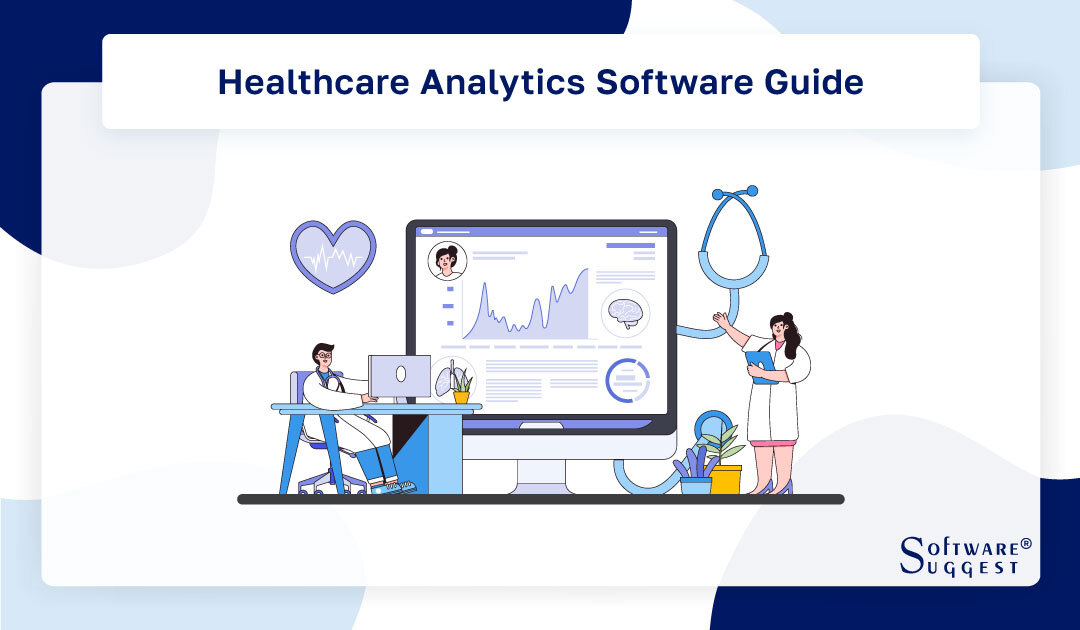
The landscape of healthcare analytics software has transformed how healthcare entities collect, analyze, and decipher data, resulting in advancements in patient care, operational streamlining, and effective decision-making.
Healthcare analytics software capitalizes on data analytics capabilities, delivering actionable insights that guide informed strategies, streamline workflows, and elevate healthcare results holistically. This detailed guide throws light on healthcare analytics software, its benefits and features along with the best platforms available in the market.
What is Healthcare Analytics Software?
Healthcare Analytics Software encompasses a collection of tools, platforms, and technologies meticulously crafted to gather, process, analyze, and present data pertaining to diverse healthcare facets. These encompass patient care, medical procedures, operational efficacy, allocation of resources, financial oversight, and beyond.
The fundamental objective of such software lies in empowering healthcare practitioners and administrators to make well-informed decisions guided by data insights, fostering enhancements in patient results, financial economy, and the optimization of operational processes.
Who Uses Healthcare Analytics Solutions?
Healthcare Analytics Solutions are employed by a diverse spectrum of stakeholders within the healthcare landscape, ranging from providers and insurers to researchers and pharmaceutical companies. Some key users include:
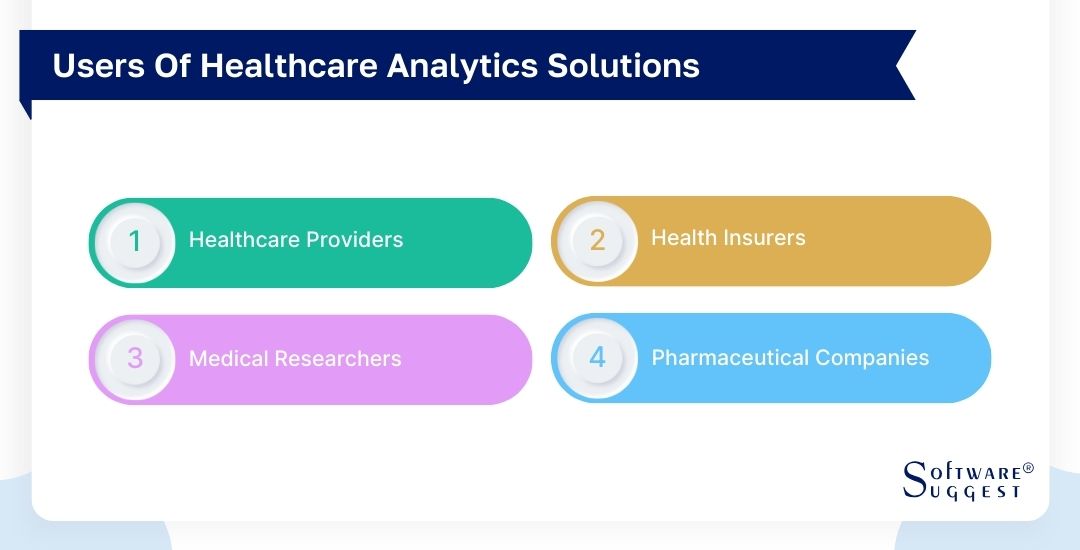
-
Healthcare Providers
Healthcare analytics software finds widespread adoption within medical facilities such as hospitals, clinics, and medical practices. These establishments harness analytics to elevate patient care quality and fine-tune operational workflows. Through the analysis of patient data, medical facilities uncover trends, patterns, and potential health concerns, enabling informed treatment decisions, efficient resource allocation, and an overall improvement in patient well-being.
-
Health Insurers
Health insurance companies also benefit from healthcare data analytics software. These solutions enable insurers to assess risk factors, predict healthcare utilization, and determine premium pricing. By analyzing data related to patient demographics, medical history, and treatment costs, health insurers can make accurate predictions about future claims and costs.
-
Medical Researchers
Medical researchers rely heavily on healthcare analytics software to advance scientific understanding, develop new treatments, and conduct epidemiological studies. These solutions allow researchers to analyze large datasets, such as clinical trial results, genetic information, and disease prevalence data.
-
Pharmaceutical Companies
Pharmaceutical companies leverage healthcare analytics solutions to enhance drug development, optimize clinical trials, and understand market dynamics. Analytics help pharmaceutical companies identify patient populations that may benefit most from their drugs, allowing for more targeted marketing and sales efforts.
Additionally, these solutions aid in monitoring the safety and effectiveness of drugs post-market release, ensuring compliance with regulations and addressing any potential issues promptly.
Benefits of Healthcare Analytics Software
Healthcare Analytics Software offers a multitude of advantages, revolutionizing patient care, resource management, and decision-making through data-driven insights.
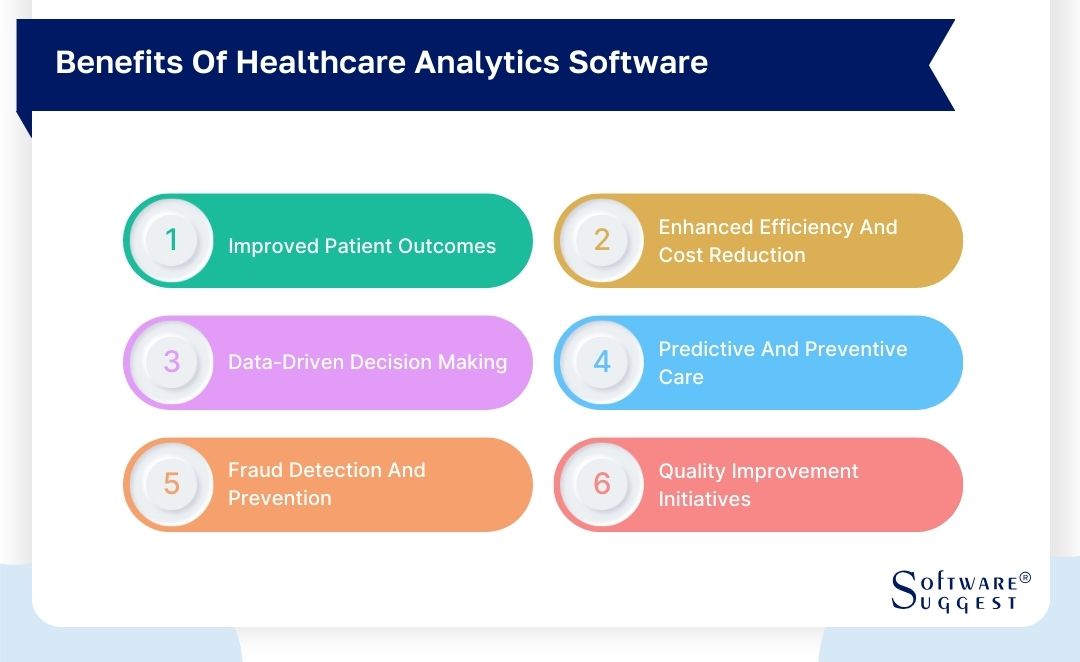
-
Improved Patient Outcomes
By analyzing a vast amount of patient data, including medical histories, test results, and treatment plans, healthcare providers can gain valuable insights into individual and population health trends. This enables them to make more accurate diagnoses, tailor treatment plans to specific patient needs, and identify potential health risks at an early stage. Ultimately, this leads to more effective interventions, reduced medical errors, and better overall patient health.
-
Enhanced Efficiency and Cost Reduction
Healthcare entities grapple with intricate resource management and cost control issues. Healthcare data analytics software aids in streamlining operational workflows, fine-tuning resource allotment, and curbing inefficiencies. By scrutinizing data concerning patient flow, staff timetables, and equipment usage, healthcare administrators can pinpoint bottlenecks and introduce enhancements.
-
Data-Driven Decision Making
At the heart of proficient healthcare administration lies evidence-based decision-making. Healthcare analytics software empowers executives, clinicians, and administrators with insights grounded in data. Through the scrutiny of both historical and real-time healthcare data, stakeholders gain the capacity to make well-informed choices regarding patient well-being, resource distribution, and strategic development.
-
Predictive and Preventive Care
Through predictive modeling, healthcare analytics software facilitates the early recognition of potential health concerns before they escalate. By scrutinizing patient healthcare data and historical patterns, healthcare providers can forecast disease outbreaks, patient readmissions, and other unfavorable occurrences. This paves the way for proactive measures, including timely interventions for high-risk patients and individually tailored preventive care strategies.
-
Fraud Detection and Prevention
Fraudulent activities can undermine the integrity of healthcare systems and result in financial losses. Healthcare analytics software can detect anomalies and patterns in billing data, claim submissions, and provider behaviors. By identifying irregularities, organizations can take proactive steps to prevent fraud and abuse, ensuring that resources are used appropriately and that patients receive legitimate health services.
-
Quality Improvement Initiatives
Healthcare analytics software plays a pivotal role in quality improvement initiatives. By analyzing data related to patient health outcomes, clinical processes, and performance metrics, healthcare organizations can identify areas for improvement. These insights enable the implementation of evidence-based best practices, fostering a culture of continuous quality improvement.
Features of Healthcare Analytics Software
The features of healthcare analytics software encompass a dynamic array of tools that empower healthcare professionals to leverage data for improved patient outcomes, operational efficiency, and informed decision-making. Some key features include:
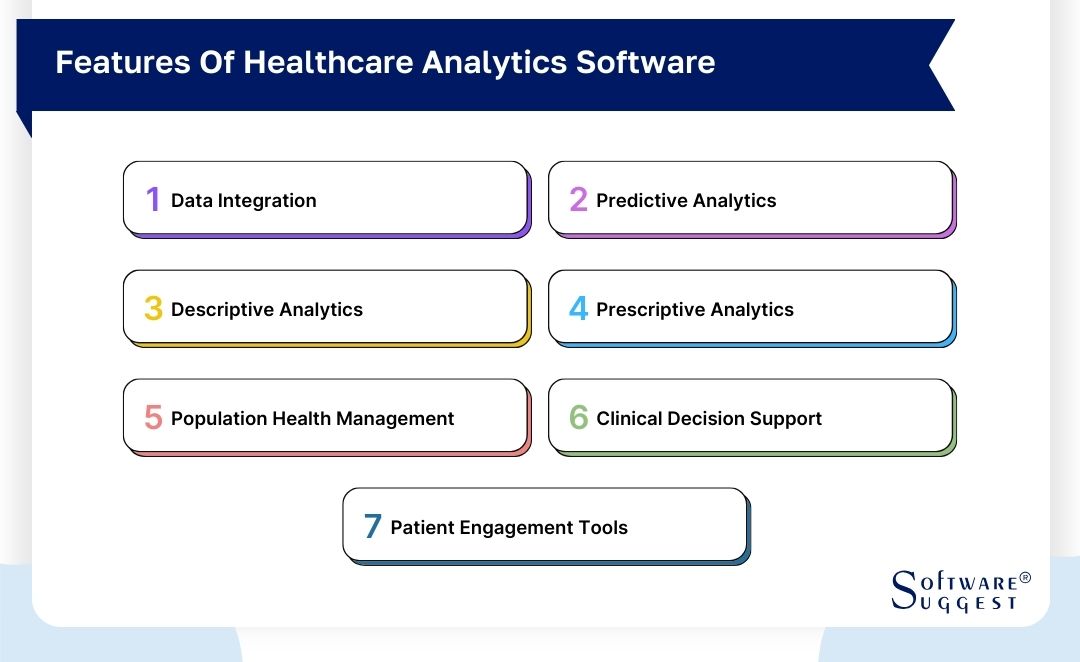
-
Data Integration
Healthcare data analytics software presents formidable data integration prowess, facilitating the seamless amalgamation of information from diverse origins, including electronic health records (EHRs), medical equipment, and administrative frameworks. This amalgamation engenders a holistic and cohesive perspective on patient well-being, fostering heightened precision and informed decision-making among healthcare practitioners.
-
Predictive Analytics
Predictive analytics within healthcare software involves using historical data and statistical algorithms to forecast future events or trends. In healthcare, this can mean predicting disease outbreaks, patient readmissions, or identifying individuals at risk of developing certain conditions.
-
Descriptive Analytics
Descriptive analytics centers on condensing and elucidating historical data to extract understanding from preceding trends and patterns. In healthcare, this can encompass the scrutiny of patient demographics, treatment records, and disease occurrence. Grasping former behaviors and results empowers healthcare experts to pinpoint areas for enhancement, optimize resource distribution, and customize interventions for distinct patient groups.
-
Prescriptive Analytics
Prescriptive analytics transcends prediction by proposing precise actions to attain sought-after results. In healthcare, this might entail proposing ideal treatment strategies based on patient attributes and medical records. Through the utilization of prescriptive analytics, healthcare practitioners can foster more enlightened choices, guarantee adherence to optimal methodologies, and amplify the caliber of patient care.
-
Population Health Management
Population health management empowers healthcare establishments to supervise and enhance the well-being of particular patient cohorts. The software consolidates and evaluates data from diverse origins to gauge the overall health condition of a demographic. This equips healthcare providers to pinpoint high-risk individuals, create tailored interventions, and gauge the efficacy of preventive actions.
-
Clinical Decision Support
Clinical decision support tools assist healthcare professionals in making well-informed and evidence-based treatment decisions. These tools provide real-time insights and recommendations based on the patient's medical history, current condition, and relevant clinical guidelines. By using clinical decision support, healthcare providers can reduce medical errors, enhance treatment accuracy, and ultimately improve patient outcomes.
-
Patient Engagement Tools
Patient engagement tools foster active patient participation in their healthcare voyage. These tools grant patients access to their health records, educational materials, and individualized health insights. By involving patients in their own care, healthcare establishments can encourage enhanced self-management, medication adherence, and holistic well-being, ultimately resulting in better health results.
How Can We Increase ROI by Using Healthcare Analytics Solutions?
Enhancing Return on Investment (ROI) through healthcare analytics solutions involves leveraging data-driven insights to optimize healthcare costs, elevate patient care outcomes, and streamline operational processes within the healthcare ecosystem.
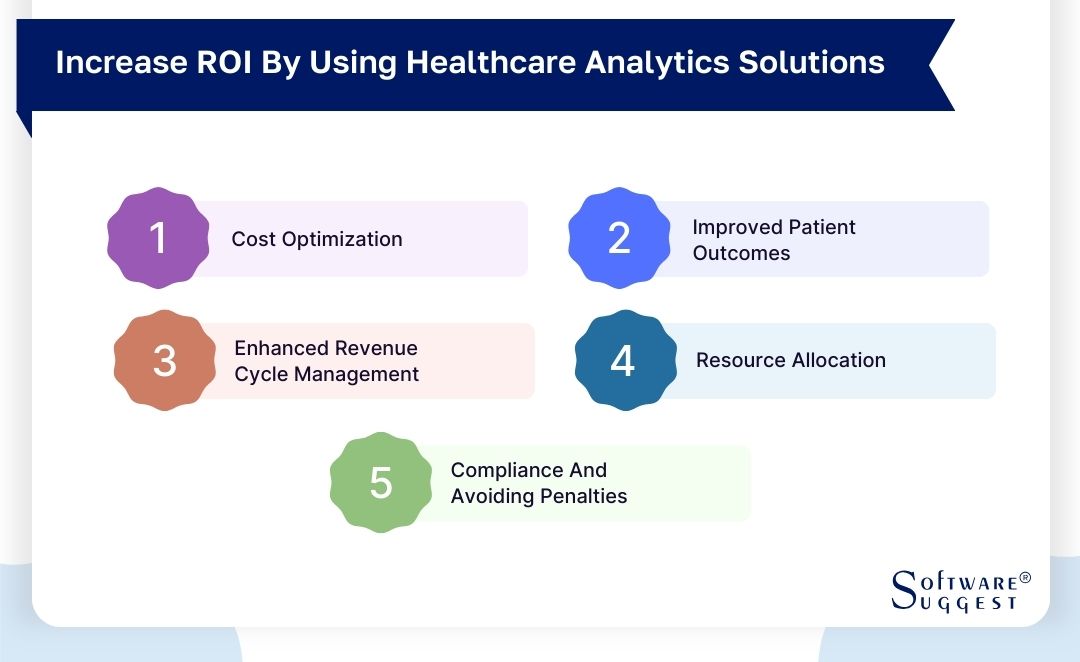
-
Cost Optimization
Healthcare analytics solutions enhance ROI by fine-tuning expenses across diverse healthcare operations. Scrutinizing data pertaining to resource usage, supply chain oversight, and operational efficacy enables organizations to pinpoint cost-saving opportunities without compromising patient well-being. This fosters improved fiscal management, minimized wastage, and ultimately elevated returns on investment.
-
Improved Patient Outcomes
Enhancing patient outcomes through healthcare analytics can indirectly contribute to ROI by reducing the need for costly treatments and readmissions. By analyzing patient data, healthcare providers can identify effective treatment strategies, personalize care plans, and proactively address health risks. This leads to better patient health, lower healthcare expenses over time, and improved reputation, ultimately driving higher patient volumes and revenue.
-
Enhanced Revenue Cycle Management
Healthcare analytics solutions can significantly impact revenue cycle management by improving billing accuracy, reducing claim denials, and optimizing reimbursement processes. Through data analysis, organizations can identify patterns of billing errors, streamline coding processes, and ensure timely claims submissions.
-
Resource Allocation
Analytics solutions enable organizations to analyze patient demand, service utilization, and staffing needs. By optimizing resource allocation based on data-driven insights, healthcare providers can reduce overutilization of resources, minimize wait times, and allocate resources where they are most needed. This leads to better patient satisfaction, operational efficiency, and cost savings.
-
Compliance and Avoiding Penalties
Healthcare data analytics software helps organizations adhere to regulatory standards and avoid penalties. By monitoring data for compliance with healthcare regulations, such as HIPAA, and identifying potential issues, organizations can mitigate legal risks and financial penalties. This safeguards the organization's reputation, prevents costly legal battles, and maintains a positive financial trajectory.
List of Top 5 Healthcare Analytics Platforms Comparison
|
Name
|
Free Trial
|
Demo
|
Pricing
|
|---|---|---|---|
|
14 Days |
Yes |
On-Request |
|
|
30 Days |
Yes |
Starting price at $140/month |
|
|
7 Days |
Yes |
Starting price at $25/User/Month |
|
|
14 Days |
Yes |
On-Request |
|
|
14 Days |
Yes |
Starting price at $725/month |
The top five healthcare analytics platforms showcase healthcare industry-leading solutions that revolutionize healthcare management. They include the following software:
1. Epic Cogito
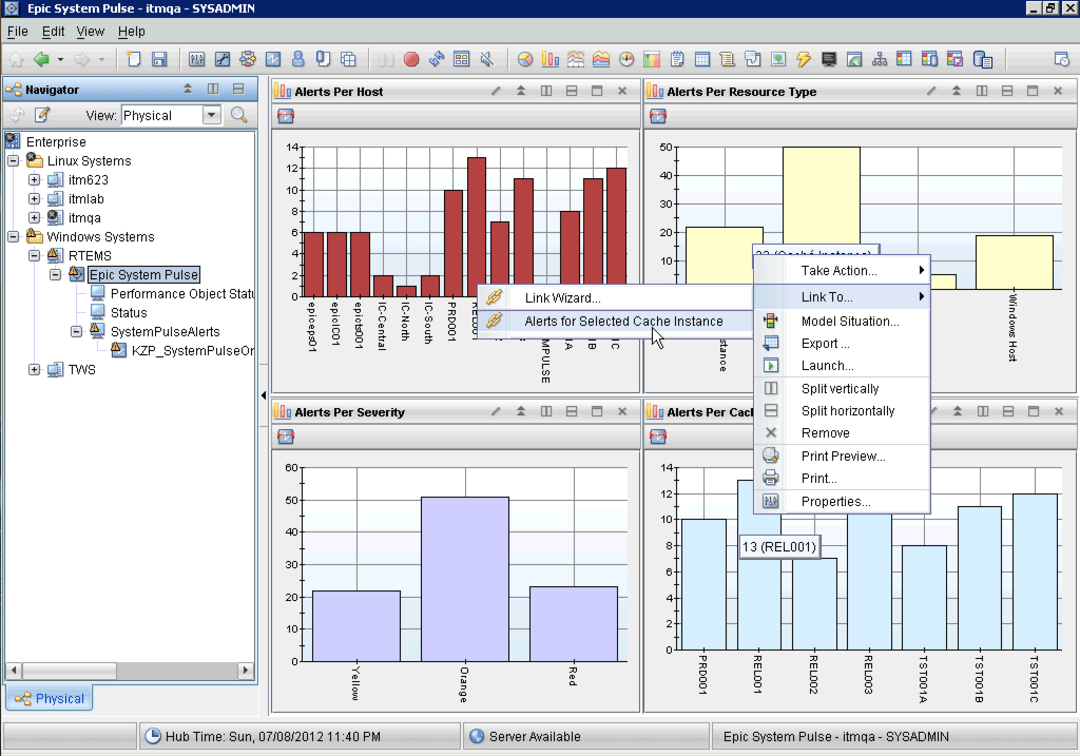
Epic Cogito stands as a robust healthcare analytics solution, equipping healthcare providers with the ability to harness data-driven insights to enhance patient care and operational effectiveness. Through features like real-time analytics, predictive modeling, and adaptable reporting, Epic Cogito empowers clinicians and administrators to execute well-informed decisions, streamline resource distribution, and elevate overall patient results.
- Real-time insights
- Predictive modeling
- Customizable reporting
- Patient data visualization
- Population health management
- Clinical decision support
- Data integration
- Real-time clinical insights improve patient care decisions.
- Customizable reporting aids in data-driven decision-making.
- Advanced predictive modeling enhances disease management strategies.
- The complex implementation may require extensive training and resources.
- Limited interoperability with non-Epic systems can hinder data integration.
Pricing
- On-Request
2. IBM Watson Health
IBM Watson Health stands at the forefront of healthcare data analytics software, harnessing artificial intelligence-driven insights, healthcare business intelligence, and natural language processing to revolutionize personalized patient care. By providing real-world evidence for drug development, interoperability, and secure data sharing, IBM Watson Health empowers healthcare professionals to navigate complex data landscapes and derive actionable insights.
- AI-driven analytics
- Natural language processing
- Interoperability
- Drug development insights
- Data sharing
- AI-driven analytics enhances personalized patient treatment plans.
- Natural language processing streamlines data extraction and analysis.
- Real-world evidence informs effective drug development strategies.
- High costs for AI-driven solutions may strain budgets.
- Initial setup and configuration can be time-consuming and complex.
Pricing
- Lite- USD 0
- Plus- Starting at USD 140/month
- Enterprise- Contact them
3. Cerner HealtheAnalytics
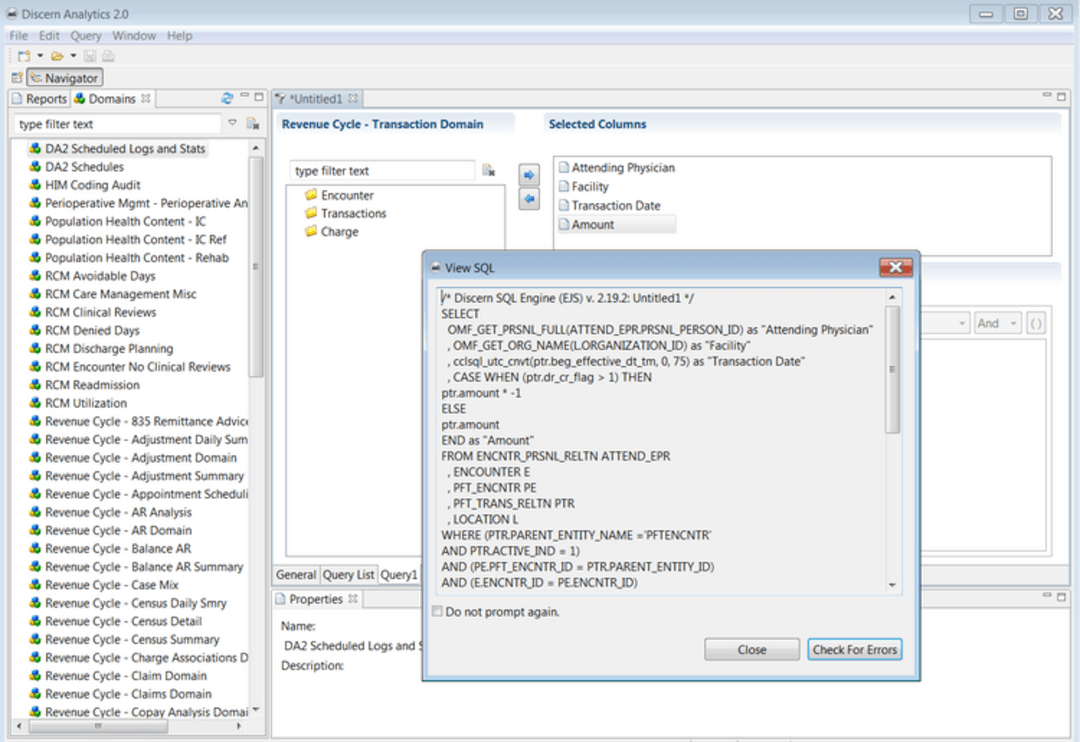
Cerner Healthe Analytics Software offers a comprehensive approach to healthcare analytics, encompassing data aggregation, population health management, and financial analytics. With customizable clinical quality measures, patient engagement tools, and interactive dashboards, Cerner HealtheAnalytics assists healthcare organizations in improving care coordination, enhancing patient engagement, and optimizing resource allocation.
- Data aggregation
- Population health management
- Financial analytics
- Customizable measures
- Patient engagement tools
- Quality improvement
- Comprehensive data aggregation supports population health management efforts.
- Financial analytics optimize revenue cycle management processes.
- Customizable clinical quality measures drive improved care outcomes.
- The user interface may require improved intuitiveness for smoother navigation.
- Limited integration with external EHR systems may hinder data sharing.
Pricing
- Starting at $25/User/Month
4. Tableau Healthcare Analytics
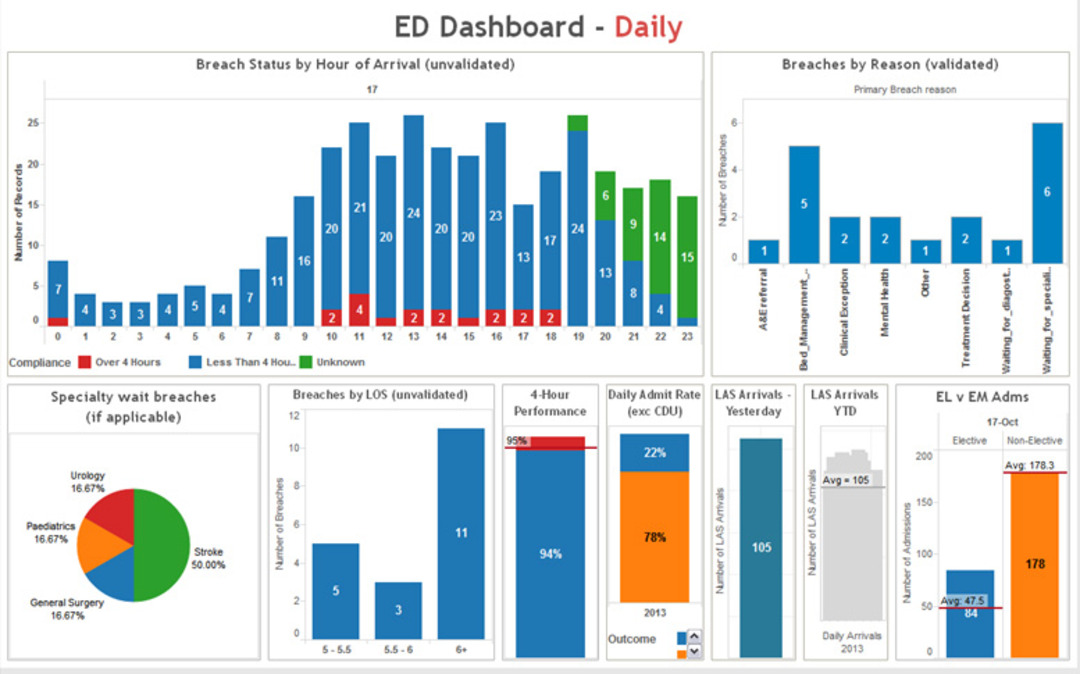
Tableau Healthcare Data Analytics Software is a user-friendly platform that excels in data visualization, ad hoc querying, and real-time monitoring. With interactive dashboards, geospatial analytics, and seamless data integration, Tableau empowers healthcare professionals to gain actionable insights from their data, facilitating evidence-based decision-making and performance improvement in the overall healthcare industry.
- Data visualization
- Ad hoc querying
- Data integration
- Geospatial analytics
- User-friendly visualizations aid in data interpretation and insights.
- Ad hoc querying facilitates quick data exploration and analysis.
- Interactive dashboards offer real-time monitoring of healthcare metrics.
- The steeper learning curve for advanced analytics and complex visualizations.
- Licensing costs can escalate as the user base expands.
Pricing
- Contact Sales Team
5. SAS Healthcare Analytics
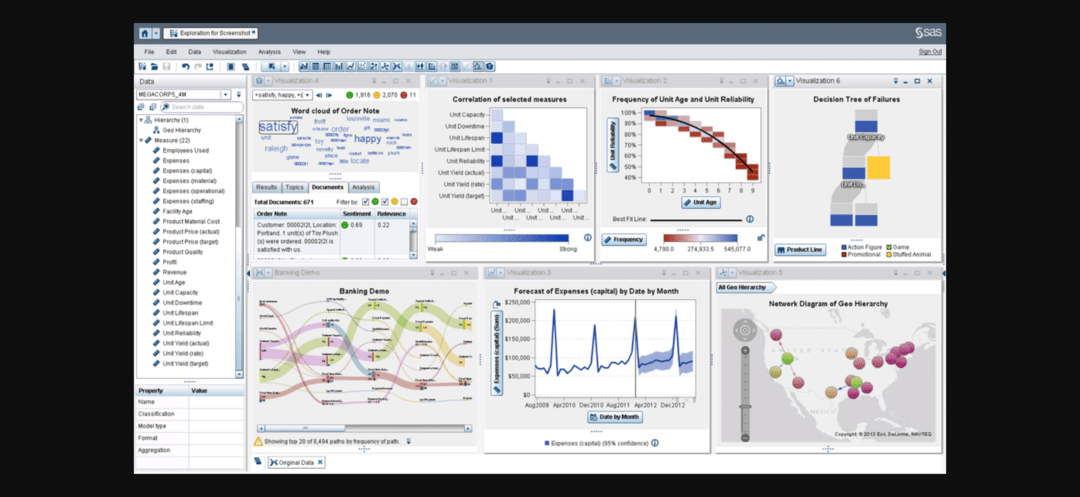
SAS Healthcare Analytics offers advanced capabilities for in-depth data analysis, predictive modeling, and fraud detection. With machine learning algorithms, compliance reporting, and robust support for clinical research, SAS empowers healthcare organizations to uncover hidden insights, proactively manage patient health, and ensure adherence to healthcare industry regulations.
- Advanced analytics
- Predictive modeling
- Fraud detection
- Patient segmentation
- Compliance reporting
- Machine learning algorithms
- Clinical research support
- Advanced analytics support cutting-edge clinical research initiatives.
- Predictive modeling aids in proactively managing patient health risks.
- Fraud detection tools safeguard financial operations from anomalies.
- Advanced features may lead to a steeper learning curve.
- Licensing costs can be relatively high for comprehensive solutions.
Pricing
- SAS Analytics Pro- Costs $8,700 for 1st year
Challenges of Healthcare Analytics Solutions
Navigating the challenges of healthcare analytics solutions requires addressing complex issues such as data quality, ethical considerations, and patient engagement to unlock the full potential of data-driven healthcare improvements.
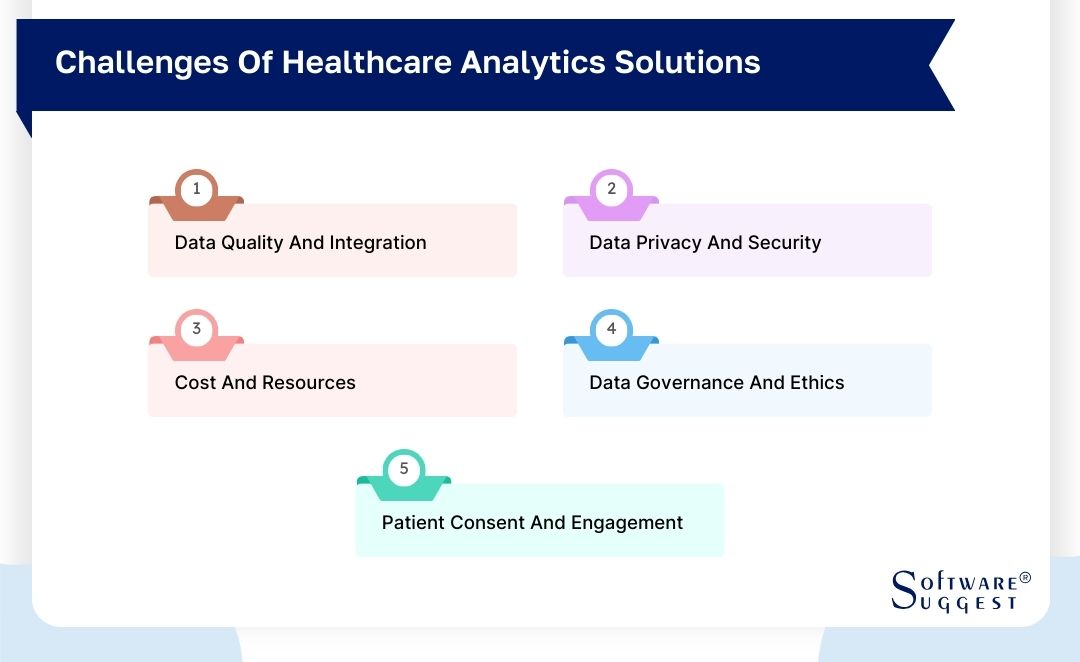
-
Data Quality and Integration
A core obstacle in healthcare analytics lies in assuring the excellence and merging of data from assorted origins. Healthcare establishments amass substantial data, encompassing electronic health records, medical instruments, and administrative frameworks. Guaranteeing the precision, thoroughness, and uniformity of this data is pivotal for insightful analysis. Deficient data quality can culminate in misguided insights and erroneous decision-making.
-
Data Governance and Ethics
Healthcare analytics involves handling sensitive patient information, which raises concerns about data governance and ethical considerations. Healthcare organizations must navigate regulations such as HIPAA (Health Insurance Portability and Accountability Act) to ensure patient privacy and data security. Striking a balance between utilizing data for insights while safeguarding patient confidentiality is a delicate task.
-
Patient Consent and Engagement
Gaining patient consent and engagement in healthcare analytics initiatives is a challenge that requires careful navigation. While patient data can provide valuable insights, obtaining informed consent for data use and analysis can be intricate. Patients need to understand how their data will be used, the potential benefits, and the associated risks. Ensuring transparent communication and obtaining explicit consent can be time-consuming.
Latest Trends In Healthcare Analytics Software
The evolving landscape of healthcare analytics software is marked by cutting-edge trends that encompass remote patient monitoring, a focus on social determinants of health (SDOH), and the integration of value-based care analytics, redefining the way healthcare organizations utilize data for improved patient outcomes and operational efficiency.
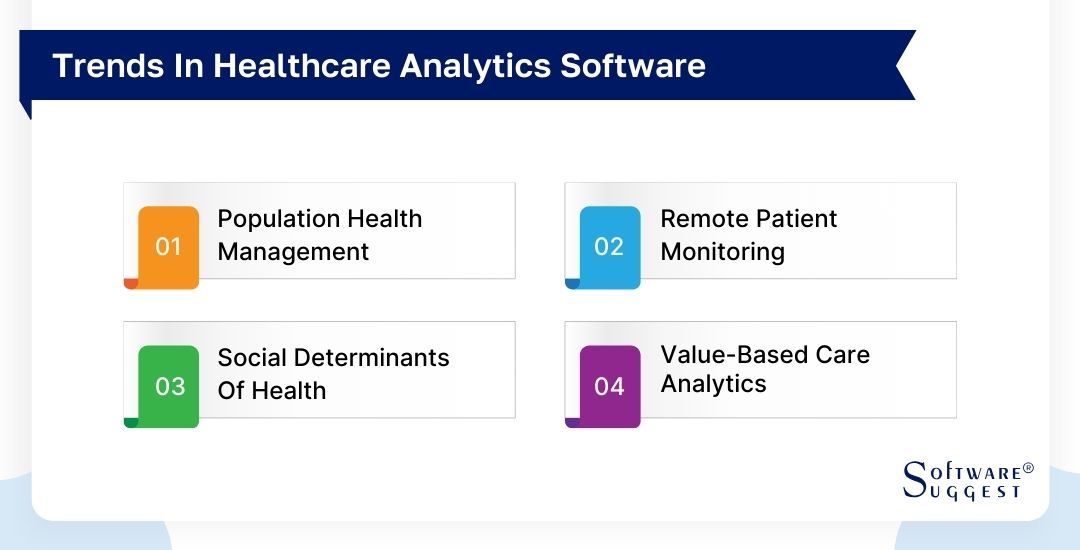
-
Remote Patient Monitoring
Remote Patient Monitoring (RPM) has emerged as a prominent trajectory within healthcare analytics software. RPM software encompasses utilizing technology to remotely oversee patients' health, frequently utilizing wearable devices and sensors. The data gathered from these devices can be seamlessly integrated into healthcare analytics platforms, enabling healthcare providers to monitor patient's vital indicators, medication compliance, and overall health status beyond the customary clinical milieu.
-
Social Determinants of Health (SDOH)
Comprehending and tackling the social determinants of health (SDOH) has emerged as a pivotal emphasis in healthcare analytics. SDOH envelops social, economic, and environmental elements that impact an individual's health results. Healthcare analytics software is progressively employed to dissect demographic information, socioeconomic status, living conditions, and other non-medical aspects, aiming to illuminate disparities in population health and formulate interventions that address the fundamental origins of health imbalances.
-
Value-Based Care Analytics
Healthcare is transitioning to a value-based care paradigm, emphasizing patient outcomes and quality over service volume for reimbursement and care provision. Healthcare analytics software plays a central role in this transformation, offering tools to monitor, assess, and scrutinize patient outcomes, care delivery protocols, and cost-efficiency.
Conclusion
In conclusion, the best healthcare analytics software is a transformative solution that empowers healthcare organizations to harness the power of data for enhanced patient care, operational efficiency, and strategic decision-making. By offering features such as robust data integration, predictive and prescriptive analytics, clinical decision support, and patient engagement tools, top-tier healthcare analytics software enables accurate diagnoses, proactive interventions, and optimized resource allocation.
This ultimately leads to improved patient outcomes, cost savings, and a more data-driven approach to addressing complex healthcare challenges, positioning it as an indispensable asset in modern healthcare ecosystems.
By Countries





















